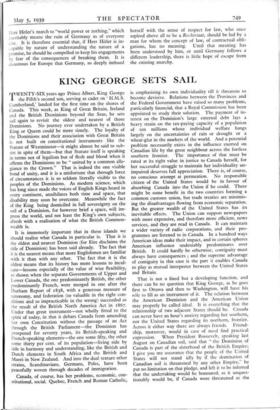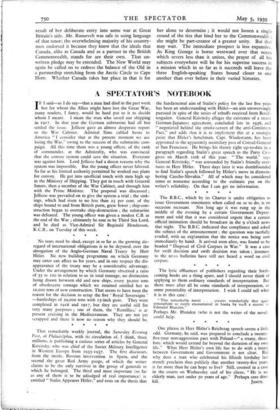KING GEORGE SETS SAIL
TWENTY-SIX years ago Prince Albert, King George the Fifth's second son, serving as cadet on H.M.S. Cumberland,' landed for the first time on the shores of Canada. This week, as King of Great Britain, Ireland and the British Dominions beyond the Seas, he sets sail again to revisit the oldest and nearest of those Dominions. No journey ever undertaken by a British King or Queen could be more timely. The loyalty of the Dominions and their association with Great Britain is not built on constitutional instruments like the Statute of Westminster—it might almost be said to sub- sist in spite of them—but that Statute itself is speaking in terms not of legalism but of flesh and blood when it affirms the Dominions to be " united by a common alle- giance to the Crown." That is indeed the one visible bond of unity, and it is a misfortune that through force of circumstances it is so seldom literally visible to the peoples of the Dominions. As modern science, which has long since made the voices of English Kings heard in every continent, annihilates both time and space, that disability may soon be overcome. Meanwhile the fact of the King being domiciled in full sovereignty on the soil of a Dominion, for however brief a space, will im- press the world, and not least the King's own subjects, afresh with a realisation of what the British Common- wealth is.
It is immensely important that in these islands we should realise what Canada in particular is. That it is the oldest and nearest Dominion (for Eire disclaims the tide of Dominion) has been said already. The fact that it is the nearest means that more Englishmen are familiar with it than with any other. The fact that it is the oldest means that its history has more lessons to incul- cate—lessons especially of the value of wise flexibility, as shown when the separate Governments of Upper and Lower Canada, the one predominantly British, the other predominantly French, were merged in one after the Durham Report of 1838, with a generous measure of autonomy, and federation (so valuable in the right con- ditions and so impracticable in the wrong) succeeded as the result of the British North America Act in 1867. Under that great instrument—not wholly fitted to the spirit of today, in that it debars Canada from amending her own Constitution without the passage of an Act through the British Parliament—the Dominion has prospered for seventy years, its British-speaking and French-speaking elements—the one some fifty, the other some thirty per cent. of its population—living side by side in harmony and understanding, like the British and Dutch elements in South Africa and the British and Maori in New Zealand. And into the dual texture other strains, Scandinavians, Germans, Poles, have been peacefully woven through decades of immigration.
Canada, of course, has her problems, economic, con- stitutional, social. Quebec, French and Roman Catholic, is emphasising its own individuality till it threatens to become devisive. Relations between the Provinces and the Federal Government have raised so many problems, particularly financial, that a Royal Commission has been appointed to study their solution. The payment of in- terest on the Dominion's large external debt lays a heavy strain on the tax-paying capacity of a population of ten millions whose individual welfare hangs largely on the uncertainties of rain or drought or a wheat-glut in the markets of the world. And a potential problem necessarily exists in the influence exerted on Canadian life by the great neighbour across the fortless southern frontier. The importance of that must be rated at its right value in justice to Canada herself, for her successful struggle to maintain her individuality un- impaired deserves full appreciation. There is, of course, no conscious attempt at permeation. No responsible citizen of the United States would be in favour of absorbing Canada into the Union if he could. There might be some benefit in the two countries forming a common customs union, but trade treaties are minimis- ing the disadvantages flowing from economic separation. But the greater wealth of the United States has its inevitable effects. The Union can support newspapers with more expensive, and therefore more efficient, news services, and they are read in Canada. It can maintain a wider variety of radio corporations, and their pro- grammes are listened to in Canada. In a hundred ways American ideas make their impact, and in certain spheres American influence undeniably predominates over British. It could hardly be otherwise; contiguity must always have consequences ; and the supreme advantage of contiguity in this case is the part it enables Canada to play as mutual interpreter between the United States and Britain.
That is not a fixed but a developing function, and there can be no question that King George, as he goes first to Ottawa and then to Washington, will have his role to fill as an instrument of it. The relation between the American Dominion and the American Union may properly be called ideal. It is everything that the relationship of two adjacent States should be. Canada can never have an hour's anxiety regarding her southern, nor the United States regarding its northern, frontier. Across it either way there are always friends. Friend- ship, moreover, would in case of need find practical expression. When President Roosevelt, speaking last August on Canadian soil, said that " the Dominion of Canada is part of the sisterhood of the British Empire; I give you my assurance that the people of the United States will not stand idly by if the domination of Canadian soil is threatened by any other Empire," he put no limitation on that pledge, and left it to be inferred that the undertaking would be honoured, as it unques- tionably would be, if Canada were threatened as the result of her deliberate entry into some war at Great Britain's side. Mr. Roosevelt was safe in using language of that tenor; the overwhelming majority of his country- men endorsed it because they knew that the ideals that Canada, alike as Canada and as a partner in the British Commonwealth, stands for are their own. That un- written pledge may be extended. The New World may again be called on to redress the balance of the Old in a partnership stretching from the Arctic Circle to Cape Horn. Whether Canada takes her place in that is for her alone to determine ; it would not loosen a single strand of the ties that bind her to the Commonwealth ; she might be part-creator of a greater unity. But that may wait. The immediate prospect is less expansive. As King George is borne westward over that ocean which severs less than it unites, the prayer of all his subjects everywhere will be for his supreme success in a mission which in so far as it succeeds will leave the three English-speaking States bound closer to one another than ever before in their varied histories.















































 Previous page
Previous page